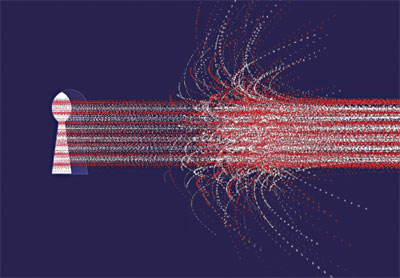The Fate of Secrets in the Age of WikiLeaks

R. VALICENTI / J. POBOJEWSKI
WASHINGTON - Can the United States government still keep a secret? In an age of WikiLeaks, flash drives and instant Web postings, leaks have begun to seem unstoppable.That may be a first impression. Sobered officials are scrambling to stop the hemorrhage of documents, even as antisecrecy radicals are discovering that some secrets may be worth protecting after all.
Still, there’s been a change. Traditional journalism, which has long accepted leaked information bit by bit, has been joined by a new counterculture of information vigilantism that promises disclosures by the terabyte.
That accounts for how, in the three big WikiLeaks document dumps since July, the usual trickle of leaks became a torrent. All of it, disguised as a Lady Gaga CD, was smuggled out of a military intelligence office, according to prosecutors, by Private First Class Bradley Manning, an American soldier now imprisoned and charged with the leak.
Two decades ago, in the days of kilobytes and floppy discs, such an ocean of data would have been far more difficult to capture and carry away. Four decades ago, using a photocopier, a leaker might have needed a great many reams of paper and a tractor-trailer.
“I do think it’s true that the large contours of national and international policy are much harder to keep secret today,” said Steven Aftergood, who runs the Project on Government Secrecy at the Federation of American Scientists, an organization in Washington that promotes transparent government. “It would not be possible to conduct a secret war in Cambodia, as took place in the Nixon administration.”
Indeed, within hours of American missile strikes in Yemen against suspected Al Qaeda camps last December, amateur video of the destruction was on YouTube. The videos labeled the strikes “American.” The strikes have never been publicly acknowledged by the Defense Department.
Or consider the speed at which news travels. During the Iran-contra affair, American arms sales to Iran were first reported by a Beirut weekly, Al Shiraa, in November 1986; it was a few days before the American press picked up the story. “Now it would take a few minutes,” said Mr. Aftergood.
One unexpected development in the Obama administration has been four prosecutions of government employees on charges of disclosing classified information, more such prosecutions than under any previous president.
That is a reason to suspect that the openness of this new era will have limits. Would-be leakers can, presumably, be dissuaded; they can be outmaneuvered in the technological cat-and-mouse game; they can learn self-restraint. And there are signs that all of that may be happening.
Thomas S. Blanton, director of the National Security Archive at The George Washington University in Washington, which obtains and publishes declassified government documents, said that WikiLeaks “tried to create a safe place for disclosures. But with Bradley Manning behind bars, who’s going to rush to follow his example?”
Now, with the third WikiLeaks collection linked to Private Manning in the news, members of the United States Congress have called with new ferocity for punishing the group and its provocateur-in-chief, Julian Assange, a 39-year-old Australian citizen who has been granted bail in Britain on sex charges from Sweden. He will be monitored by the police and will not be allowed to travel abroad.
The Obama administration is determined to to preserve its secrets. The Defense Department is scaling back information sharing, which its leaders believe went too far after information hoarding was blamed for the failure to detect the September 11 plot.
The department has also stripped CD and DVD recorders from its computers; it is redesigning security systems to require two people, not one, to move large amounts of information from a classified computer to an unclassified one; and it is installing software to detect downloads of unusual size.
Yet even as the government seeks to rein in WikiLeaks, WikiLeaks is reining in itself. The confidential diplomatic cables it disclosed have unquestionably turned the discreet world of diplomacy upside down. But the disclosures have been far more modest than WikiLeaks’ self-proclaimed dedication to total transparency might suggest.
Had it chosen to do so, WikiLeaks could have posted on the Web all 251,287 confidential diplomatic cables about six months ago, when the group obtained them. Instead, it shared the cables with traditional news organizations . So far, fewer than 1 percent of the cables had been released on the Web by the antisecrecy group, The Times and four European publications combined.
“They’ve actually embraced” the mainstream media, “which they used to treat as a cuss word,” Mr. Blanton said. “I’m watching WikiLeaks grow up. What they’re doing with these diplomatic documents so far is very responsible.”
When the newspapers have redacted cables to protect diplomats’ sources, WikiLeaks has generally been careful to follow suit. Its volunteers now accept that not all government secrets are illegitimate; for example, revealing the identities of Chinese dissidents, Russian journalists or Iranian activists who had talked to American diplomats might subject them to prison or worse.
But WikiLeaks has not quite joined the ranks of traditional publishing.
Mr. Assange has created what he calls an “insurance” plan . The group has put on the Web encrypted files containing a huge trove of documents that have not yet been released. Thousands of people have downloaded the files.
If the United States moves to prosecute, Mr. Assange has said, the group will release the encryption key, in effect making public tens of thousands of unredacted cables - and who knows what other dangerous secrets.
It is a 21st-century threat, and one the Obama administration is taking very seriously.
SCOTT SHANE ESSAY
스마터리빙
more [ 건강]
[ 건강]이제 혈관 건강도 챙기자!
[현대해운]우리 눈에 보이지 않기 때문에 혈관 건강을 챙기는 것은 결코 쉽지 않은데요. 여러분은 혈관 건강을 유지하기 위해 어떤 노력을 하시나요?
 [ 건강]
[ 건강]내 몸이 건강해지는 과일궁합
 [ 라이프]
[ 라이프]벌레야 물럿거라! 천연 해충제 만들기
 [ 건강]
[ 건강]혈압 낮추는데 좋은 식품
[현대해운]혈관 건강은 주로 노화가 진행되면서 지켜야 할 문제라고 인식되어 왔습니다. 최근 생활 패턴과 식생활의 변화로 혈관의 노화 진행이 빨라지고
사람·사람들
more많이 본 기사
- 송지효 “’런닝맨’ 출연 중 8년 ♥장기 연애했다” 폭탄 고백..멤버 모두 ‘충격’
- 신혼부부 ‘역대 최저’ 24%는 3억 이상 대출
- 트럼프 “인디애나 선거구 조정 반대한 공화의원들, 교체돼야”
- 굽히지 않는 젤렌스키…트럼프에 역제안 카드로 레드라인 저지
- 통일교 특검 대신 “내란 2차 특검”… 민주당 ‘철벽 방어’
- 與, 은행법 처리뒤 ‘경찰관직무집행법’ 상정…국힘 또 필버
- 선교사 아들 가나대사로 금의환향… “한국·가나는 두 어머니”
- 내란특검, 김용현 추가 기소… “HID요원 등 명단 노상원에 넘겨”
- ‘인니 수마트라섬 대홍수’ 사망자 1천명 넘어…218명 실종
- TV 나와 암투병 근황 공개한 찰스 英국왕… “조기검진 중요해요”
- 국방부 “시리아서 공격받아 미군 2명 사망…공격범 사살”
- “한국, 재래식 방위주도” 한미 핵협의그룹 첫 명시
- 변요한♥티파니, 결혼 전제 열애 인정
- 제미나이 추격 오픈AI 새 모델 GPT-5.2 조기 공개
- AI공급망 동맹 ‘팍스 실리카’ 8개국 참여
- 美, 카리브해 군사자산 확대… “베네수엘라에 지상·전자전 위협”
- ‘나혼산’ 박나래, 흔적도 없이 하차… 1
- 한화, 호주 방산업체 최대주주 된다
- 소셜연금 NY 2,018달러·NJ 2,190달러
- 트럼프 “태국·캄, 교전 중단 합의”…태국 “군사 작전 계속”
- “’삐빅’ 비트코인으로 결제할게요”…맥도날드·편의점서도 쓴다는 ‘이곳’, 어디?
- “귀금속 역사상 가장 극적인 재평가”…올해는 銀이 金 앞섰다 [공준호의 탈월급 생존법]
- 김지민 “유부남과 불륜, 날 알리바이로 이용”..친구와 손절한 사연 [이호선의 사이다]
- 또 복권열풍⋯파워볼 잭팟 10억달러로
- 美지상작전 임박설 속 베네수 이민자 송환 중단 놓고 ‘혼선’
- 종묘 일대 세계유산지구로 세운4구역 개발 영향 줄까
- ‘양육비 미지급’ 김동성 “내가 月700만원? 통장 압류된 신용불량자”
- “보안사고 반복 땐 과징금 폭탄”… 해킹과 전면전 선포한 과기부
- 젤렌스키 측근 협상가가 FBI국장을 왜?…비밀회동 목적 의문
- “엔비디아, 中수요 반영 H200 증산”…일각선 “中, 수입거부할듯”
- 우크라 “러 점령 쿠피안스크 일부 탈환”…젤렌스키 방문
- ‘고가 논란’ 북중미 월드컵 티켓, 판매 첫날 500만건 신청
- 트럼프, 중남미 마약카르텔 공습 확대의지… “지상서도 시작한다”
- 뉴욕증시, 브로드컴 비관론에 AI 테마 ‘와르르’…나스닥 1.7%↓ 마감
- 김민선 학장 자선행사서 40만달러 기금조성
- 임소정씨, VA 주하원의원 도전
- ‘오바마케어 보조금’ 올해 말 종료 가능성 ↑ 커져
- 한국도 참여한 美주도 AI 동맹 “비시장적 관행에 공동 대응”
- ‘정국 열애설’에 뿔난 아미 ‘워워’..BTS 완전체, 전역→웃으며 연습실 회동 첫 인증샷
- 美 레전드 깜짝 전망 “한국, 북중미 월드컵 A조 1위로 32강”
- 워싱턴 산악인, 스톤마운틴 정상에 서다
- “머스크의 X, 3분기 매출 7억 달러대…순손실 5억 달러대”
- 양로원 한인노인들에 온정 전해
- 주한미군사령관 “전작권 전환, 시기보다 조건 봐야”
- MD한인회장 또‘무후보’
- 송미숙 전 이사장 단독 출마
- FDA, 우울증 치료 ‘뇌 자극’ 가정용 헤드셋 기기 첫 승인
- 미네소타 보조금 사기, 안보 문제로 비화…월즈 ‘곤혹’
- 한국 교사 10명, 페어팩스 초등교 배치
- 세모(歲暮)를 보내는 마음
1/5지식톡

-
 테슬라 자동차 시트커버 장착
0
테슬라 자동차 시트커버 장착
0테슬라 시트커버, 사놓고 아직 못 씌우셨죠?장착이 생각보다 쉽지 않습니다.20년 경력 전문가에게 맡기세요 — 깔끔하고 딱 맞게 장착해드립니다!장착비용:앞좌석: $40뒷좌석: $60앞·뒷좌석 …
-
 식당용 부탄가스
0
식당용 부탄가스
0식당용 부탄가스 홀세일 합니다 로스앤젤레스 다운타운 픽업 가능 안녕 하세요?강아지 & 고양이 모든 애완동물 / 반려동물 식품 & 모든 애완동물/반려동물 관련 제품들 전문적으로 홀세일/취급하는 회사 입니다 100% …
-
 ACSL 국제 컴퓨터 과학 대회, …
0
ACSL 국제 컴퓨터 과학 대회, …
0웹사이트 : www.eduspot.co.kr 카카오톡 상담하기 : https://pf.kakao.com/_BEQWxb블로그 : https://blog.naver.com/eduspotmain안녕하세요, 에듀스팟입니다…
-
 바디프렌드 안마의자 창고 리퍼브 세…
0
바디프렌드 안마의자 창고 리퍼브 세…
0거의 새제품급 리퍼브 안마의자 대방출 한다고 합니다!8월 23일(토)…24일(일) 단 이틀!특가 판매가Famille: $500 ~ $1,000Falcon: $1,500 ~ $2,500픽업 & 배송직접 픽업 가능LA…
-
 바디프렌드 안마의자 창고 리퍼브 세…
0
바디프렌드 안마의자 창고 리퍼브 세…
0거의 새제품급 리퍼브 안마의자 대방출 한다고 합니다!8월 23일(토)…24일(일) 단 이틀!특가 판매가Famille: $500 ~ $1,000Falcon: $1,500 ~ $2,500픽업 & 배송직접 픽업 가능LA…
케이타운 1번가
오피니언

22기 LA평통 출범에 거는 기대

연말 시즌 사기·범죄 경계해야
 메건 매카들 워싱턴포스트 칼럼니스트
메건 매카들 워싱턴포스트 칼럼니스트 [메건 매카들 칼럼] 장편영화의 마지막 챕터인가
 김미선 서북미문인협회 회장시인
김미선 서북미문인협회 회장시인 [한국춘추] 하늘을 계산한 사람들, 칠정산
 이희숙 시인·수필가
이희숙 시인·수필가 [금요단상] 그을린 자리에서 다시
 심상용 / 서울대 미술관장
심상용 / 서울대 미술관장 [미술 다시보기] 지옥에 대하여
 서정명 / 서울경제 기자
서정명 / 서울경제 기자[만화경] 주한미군과 ‘도련선 리스크’
 한 영 재미수필가협회 회장
한 영 재미수필가협회 회장 [한영의 독서칼럼] 불안한 사람들
 정영현 서울경제 테크성장부장
정영현 서울경제 테크성장부장 [여명] 콘크리트가 데이터가 됐을 뿐, 달라진 게 없다
1/3지사별 뉴스

“마약밀매·인신매매 등 국제범죄 척결” ‘국토안보 태스크포스’ 뉴욕지부 출범
연방 국토안보부가 10일 ‘국토안보 태스크포스’(HSTF) 뉴욕지부를 출범시켰다.HSTF는 마약 카르텔, 인신매매, 자금세탁, 갱단 등 국제범…
‘오바마케어 보조금’ 올해 말 종료 가능성 ↑ 커져

한국 교사 10명, 페어팩스 초등교 배치
‘글로벌 앰버서더 티처스 프로그램’(Global Ambassador Teachers Program)은 국제 교사 교환 프로그램 가운데 하나로 …
김찬수씨, 포토맥 포럼에 2천달러 기부

초강경 추방 드라이브… 한인사회 불안감 확산
도널드 트럼프 행정부가 출범 직후 불법체류자 100만 명 추방 목표 달성을 위해 초강경 조치를 본격화하면서 미주 한인사회에 불안감이 심각하게 …
<부음> 이명무 전 SF 체육회장 부인상

오늘 하루 이 창 열지 않음 닫기 





















































.png)


댓글 안에 당신의 성숙함도 담아 주세요.
'오늘의 한마디'는 기사에 대하여 자신의 생각을 말하고 남의 생각을 들으며 서로 다양한 의견을 나누는 공간입니다. 그러나 간혹 불건전한 내용을 올리시는 분들이 계셔서 건전한 인터넷문화 정착을 위해 아래와 같은 운영원칙을 적용합니다.
자체 모니터링을 통해 아래에 해당하는 내용이 포함된 댓글이 발견되면 예고없이 삭제 조치를 하겠습니다.
불건전한 댓글을 올리거나, 이름에 비속어 및 상대방의 불쾌감을 주는 단어를 사용, 유명인 또는 특정 일반인을 사칭하는 경우 이용에 대한 차단 제재를 받을 수 있습니다. 차단될 경우, 일주일간 댓글을 달수 없게 됩니다.
명예훼손, 개인정보 유출, 욕설 등 법률에 위반되는 댓글은 관계 법령에 의거 민형사상 처벌을 받을 수 있으니 이용에 주의를 부탁드립니다.
Close
x